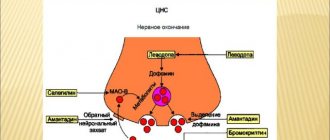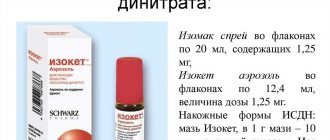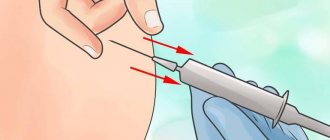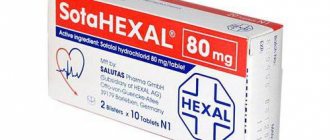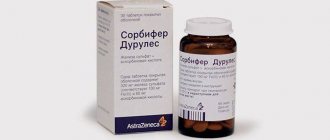Pharmacodynamics and pharmacokinetics
Albarel is an oxazoline that is capable of selectively interacting with imidazoline receptors located in the cortical and peripheral vasomotor centers (mainly renal). When rilmenidine binds to imidazoline receptors, the sympathomimetic activity of cortical and peripheral centers is inhibited, which consequently causes a decrease .
The hypotensive effect of Albarel is dose-dependent; addiction does not occur with long-term therapy.
The effect of the drug lasts 24 hours, including during physical activity.
Contraindications
As noted in the instructions for Albarel, the drug is contraindicated in the following cases:
- State of severe depression;
- Pregnancy;
- Breastfeeding;
- Severe renal failure;
- Hypersensitivity to the components of the drug.
The use of Albarel under the age of 18 is not recommended. And when prescribing the drug to patients who have suffered a myocardial infarction or stroke, periodic medical monitoring is necessary.
Side effects
Adverse events were recorded from various organs and systems:
- Central nervous system: asthenia , insomnia or drowsiness , increased fatigue when performing physical exercises; of depression , anxiety , and seizures occurred .
- CVS: possible palpitations ; in isolated cases - “cold” extremities, orthostatic hypotension .
- Digestive system: epigastric pain, diarrhea, dry mouth, sometimes nausea and constipation.
- Epidermis: skin rash and itching.
- Other adverse reactions include peripheral edema, sexual dysfunction, hot flashes .
Possible harm
Taking the drug may cause negative reactions from the body. Sometimes they can be caused by a lack of adaptation to the action of the drug, in other cases they indicate intolerance or other contraindications.
Negative body reactions and overdose
It is necessary to know what adverse reactions may occur in order to notice them in time and consult a doctor. The main side effects include:
- dizziness;
- headache;
- drowsiness;
- increased heart rate;
Allergic reaction to the drug
insomnia;
- anxiety;
- depressive moods;
- stomach ache;
- stomach upsets;
- attacks of nausea;
- skin rashes;
- itching;
- muscle pain;
- swelling;
- fatigue;
- weakness;
- decreased libido levels.
Their appearance may be episodic, and as the body adapts to the effects of Albarel, these features are eliminated. But with their constant presence and intensification, you should be wary, since this is a sign of the negative effect of the drug.
When using the drug, you must follow the dose prescribed by your doctor, since an overdose can lead to adverse consequences.
Taking too large a dose of the drug leads to a significant decrease in blood pressure. In this regard, concentration is impaired, and symptoms from the list of side effects presented above also appear.
The effects of an overdose can be neutralized by gastric lavage and symptomatic therapy. The most commonly used are sympathomimetics and enterosorbents. Albarel does not have a specific antidote.
Precautionary measures
Particular care when handling the drug is required for the following groups of patients (Table 3)
Table 3 - Precautions for using Albarel
| Patient group | Restrictions on use |
| Pregnant women | The specific effects of rilmenidine on pregnancy are unknown. During experiments on animals, no pathological effects were detected, but to prevent possible complications, Albarel is not prescribed to women at this time. |
| Nursing mothers | Based on research results, it is known that the active component passes into breast milk, which may be unsafe for the baby. In this regard, taking the medicine during natural feeding is prohibited. |
| Children | The safety and effectiveness of the product have not been studied for them, therefore its use in persons under 18 years of age is not allowed. |
| Aged people | For such patients, general rules are provided. But when treating with Albarel at this age, the condition of the kidneys should be periodically checked, since older people are at risk of developing age-related disorders. |
| Patients with kidney failure | Since the medicine is eliminated by the kidneys, it is very important that this organ functions properly. For mild to moderate renal failure, dosage adjustments often do not need to be adjusted, but it is advisable to conduct an examination once a year. In severe cases of this disease, treatment with Albarel is contraindicated. |
If the patient has recently suffered a stroke or heart attack, it is necessary to especially closely monitor changes in his condition. When discontinuing a medication, you should not stop taking it immediately; it is better to do this gradually. Since Albarel may cause drowsiness, you should be careful when driving or operating machinery.
Compatibility with other drugs
Caution is also important when using the drug together with certain other medications, including:
- Sultopride;
- ethanol;
- beta blockers;
MAO inhibitors;- baclofen;
- neuroleptics;
- antidepressants;
- hypotensive;
- corticosteroids;
- alpha-blockers;
- analgesics;
- antihistamines;
- antitussives.
Most of the listed drugs can be used together with Albarel, but it is necessary to adjust the dosage, since they can strengthen or weaken the effect of the drug.
Interaction
It is not recommended to take Albarel with MAO inhibitors, or to consume alcohol-containing products. In addition, the following manifestations of drug interactions with Albarel have been identified:
- With tricyclic antidepressants, a decrease in its antihypertensive effect is observed.
- With vasodilators , diuretics and antihistamines - potentiation of the Albarel effect.
- With drugs that depress the central nervous system - increased drowsiness.
Indications and instructions for use
The drug is prescribed for arterial hypertension. This disease involves a systematic increase in the patient's blood pressure. This is the only indication for its use. Sometimes it is used for other diseases accompanied by increased blood pressure, as an adjuvant.
Dosage
The medication is taken orally. It is most convenient to do this in the morning, during meals. The tablets do not need to be crushed or chewed, just drink water. The dosage depends on the severity of the disease. In most cases, 1 mg per day is prescribed.
Imidazoline receptors: participation in blood pressure regulation
If such a schedule does not ensure a decrease in blood pressure to normal a month after the start of treatment, then the dose of the medicine is doubled, then the tablets are taken one in the morning and one in the evening. The maximum allowable amount of the drug per day is 2 mg.
It is also necessary to take into account the functioning of the kidneys, since rilmenidine is excreted through them. If there are significant disturbances in their functioning, the substance may be retained in the body, which can lead to an overdose and a severe decrease in blood pressure.
Albarel: mechanism of action on systems of immediate and delayed blood pressure regulation
In this case, a dose adjustment or replacement of the medicine with another is necessary. But this is only necessary in cases of severe renal failure. Mild to moderate degrees of development of this disease require the use of the usual dosage. But the patient should periodically monitor the condition of the kidneys.
Contraindications
In some cases, taking Albarel is prohibited. These include:
- intolerance to the active component;
- increased sensitivity to other components;
age less than 18 years;- pregnancy;
- lactation period;
- severe renal failure;
- lack of lactase;
- galactose intolerance;
- depression;
- glucose-galactose malabsorption;
- use of Sultopride.
There are also situations in which taking the drug is allowed, but strict monitoring of the patient’s condition is required. These include:
- recent stroke;
- recent heart attack;
- heart failure;
- frequent drinking of alcohol;
- use of beta blockers.
If these features are present, the doctor can prescribe medicine only after examination. He must also monitor the progress of treatment. And the patient should carefully monitor changes in his well-being and report them to a specialist so that timely action can be taken.
Albarel's analogs
Level 4 ATC code matches: Tenzotran
Moxonitex
Moxonidine
Physiotens
Clonidine
Tenaxum is also an antihypertensive drug from the oxazoline group. It has a very similar list of side effects and contraindications, however, it is more expensive.
Composition, release form and analogues
Albarel is available in the form of round, biconvex white tablets, which are engraved on both sides in the form of an H sign. One tablet of the drug contains 1.544 mg of rilmenidine dihydrogen phosphate, which is the active ingredient in its composition, and the following excipients:
- Microcrystalline cellulose – 33.646 mg;
- Solid paraffin – 155 mcg;
- White beeswax – 25 mcg;
- Lactose – 47 mg;
- Sodium carboxymethyl starch – 4.5 mg;
- Anhydrous colloidal silicon dioxide – 230 mcg;
- Talc – 2 mg;
- Magnesium stearate – 900 mcg.
One cardboard pack of Albarel may contain 10, 20 or 30 tablets of the drug in blisters.
Among Albarel's analogues, the drugs Tenaxum and Rilmenidine can be distinguished.
Albarela price, where to buy
You can buy a package of Albarel tablets No. 30 for 650-720 rubles.
- Online pharmacies in RussiaRussia
ZdravCity
- Albarel tablets 1 mg 30 pcs. Servier/Egis
RUB 827 order
Features of the medicine
The drug "Albarel", analogs, instructions for use of which are presented below, has a hypotensive effect (depending on the dosage of the drug taken) on diastolic and systolic blood pressure in a standing or lying position. Administration of this medication at therapeutic doses (i.e., 1 or 2 mg per day) has been shown to be effective in treating moderate to mild hypertension.
According to experts, the effect of this remedy lasts throughout the day. Moreover, it is especially effective during physical activity.
Long-term use of the drug does not cause addiction.
Prohibitions for use
The use of the drug "Albarel" is prohibited when:
- pregnancy;
- severe depression;
- renal failure (severe);
- breastfeeding;
- hypersensitivity to rilmenidine or other components of the drug.
It should also be noted that this medicine is not used in pediatric practice.
Kinetics
Are Albarel tablets absorbed? The instructions for use state that the mentioned medicine is completely and very quickly absorbed from the intestines. After taking a single dose of the drug, its highest concentration in plasma is observed after 2 hours.
The absolute bioavailability of the drug is 100%. It should also be noted that it does not undergo first pass through the liver.
The patient's equilibrium state is established only from the 3rd day of regular pill taking. In people with hypertension who are treated for several years, the plasma concentration of the drug remains stable.
This medication is excreted in breast milk. Its metabolites are found in urine only in trace amounts. The half-life of the drug is about 8 hours. This period does not change even if the tablets are re-prescribed.
Properties of the drug
What is so special about a product like Albarel? Instructions for use and reviews from experts state that taking this medicine in therapeutic doses does not affect the functioning of the heart in any way, and also does not cause water and sodium retention in the body and does not disrupt metabolic balance.
This drug reduces peripheral vascular resistance without any changes in cardiac output. It should also be noted that electrophysiological indices and myocardial contractility while taking this medication remain unchanged.
The antihypertensive drug in question does not cause orthostatic hypotension (including in the elderly), does not affect renal blood flow, does not interfere with the physiological response (compensatory) of the heart rate to physical activity, and also does not affect fat and carbohydrate metabolism, filtration fraction and glomerular filtration.
Special Information
If the drug is used by people who have recently suffered a stroke or myocardial infarction, they require constant medical monitoring.
Due to the good tolerability of Albarel tablets, they can be prescribed to elderly patients, as well as to patients with diabetes mellitus.
If it is necessary to stop treatment, the dosage of the drug must be reduced gradually. It should be remembered that in most cases, drug withdrawal is not accompanied by any side effects.
It is prohibited to prescribe Albarel simultaneously with MAO inhibitors and alcohol-containing products.
There is insufficient clinical information about the effectiveness and safety of the drug in children and minors. In this regard, this drug should not be prescribed to this category of patients.
In therapeutic doses, Albarel does not have any effect on human psychomotor reactions. If the drug was taken in large quantities or together with drugs that depress the activity of the central nervous system, then in this case the patient is prohibited from driving a vehicle, as well as from engaging in other hazardous activities.


